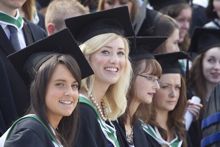2010 Press Releases
06.09.2010
Over 500 students graduated today (September 6th 2010) on the first day of UCC’s week-long Autumn Conferring Ceremonies.
Among the undergraduate and postgraduate students who graduated from the College of Arts, Celtic Studies & Social Sciences were 336 students with a BA (Joint Honours). A further 10 graduated with a BA (Distance Education). There were 71 BSocSc (Hons); 20 BSocSc (Youth & Community Work); 18 Bachelor of Social Work (BSW Hons) and 48 Master of Social Work (MSW).
The Conferring Addresses were delivered by Professor John A. Murphy, Emeritus Professor of History, UCC. In his speech, Professor Murphy referred to the progress made in recent decades in the democratisation of entry to higher education. “Inequity of educational opportunity would continue to prevail as long as there were large deprived areas of our cities where going to College wasn’t ever a remote aspiration”, he said. He praised the universities themselves, through schemes such as UCC Plus+, for their initiative in encouraging students from low-income households to come to university, and in fostering their subsequent progress as undergraduates. He said it was gratifying to see that higher education agencies nationwide were now making general provision in allocating college places to mature students, the disabled and other disadvantaged groups.
Professor Murphy urged the new graduates at some point in their careers to get involved in politics, nationally or locally. “As in many other careers, the individual is motivated by public service as well as by personal ambition. For all the sleaze, mediocrity and cynicism, the heritage of constitutional politics is a precious one which should not be ignored by an educational elite. And politics is the most important mechanism in the never-ending pursuit of social justice,” he said.
Conferring Address by Professor John A. Murphy, Emeritus
Professor of History, UCC
Professor John A Murphy, who spoke to three
different groups of newly conferred graduates, referred to the progress made in
recent decades in the democratisation of entry to higher education. Inequity of educational opportunity
would continue to prevail as long as there were large deprived areas of our
cities where going to college wasn’t even a remote aspiration. Meanwhile, at a time of drastic
cutbacks in educational funding, it was vitally important to safeguard the hard-won
advances made in democratising access.
The points system, with all its imperfections, was an egalitarian shield
of meritocracy against privileged interests. We should be wary of insidiously neo-elitist fancy talk
about aptitude tests.
Professor Murphy praised the universities themselves, through schemes such as UCC PLUS+, for their initiative in encouraging students from low-income households to come to university, and in fostering their subsequent progress as undergraduates. Indeed, it was gratifying to see that higher education agencies nationwide were now making generous provision in allocating college places to mature students, the disabled and other disadvantaged groups.
Professor Murphy urged the new graduates at some point in their careers to get involved in politics, nationally or locally. They should not subscribe to the vulgar cant that all politicians are corrupt. As in many other careers, the individual is motivated by public service as well as by personal ambition. For all the sleaze, mediocrity and cynicism, the heritage of constitutional politics is a precious one which should not be ignored by an educational elite. And politics is the most important mechanism in the never-ending pursuit of social justice.
Professor Murphy also said that in his early manhood, he had lived in an atmosphere of censorship and thought-police in university, church and wider society. Ironically, these supposed custodians of Irish values were continually denouncing brainwashing in communist regimes. Against that earlier background, he believed that freedom of expression was a supreme value, with no mealy-mouthed qualifications. Student societies should have the right to have the speakers of their choice on campus, no matter how unpalatable – even holocaust sceptics, apartheid apologists and Tea Partyers. In this matter, the university authorities should defend student societies against the censorious and clamorous opposition of the new priesthood of the left.
Finally, surveying the remarkable spectacle of women graduates outnumbering men by three to one, Professor Murphy said this was a sight which would enrage ayatollahs of all creeds, past and present, foreign and domestic. By the same token, it would have gladdened the hearts of the social reformer William Thompson, who in 1825 deplored the oppression of one half of the human race by the other, and of that doughty champion of socialism and feminism, James Connolly.
In conclusion, Professor Murphy rendered some verses of the student celebratory song, Gaudeamus Igitur.
Picture: Students who graduated today (September 6th 2010).

